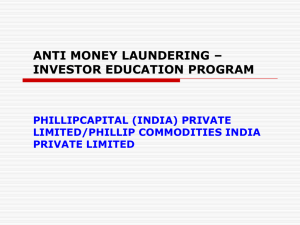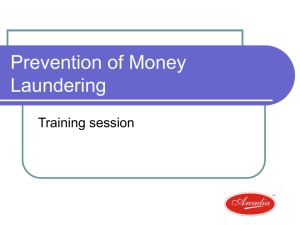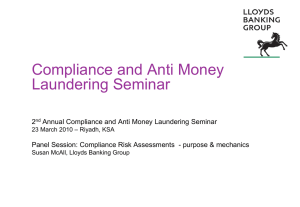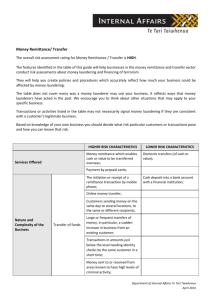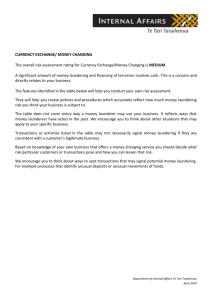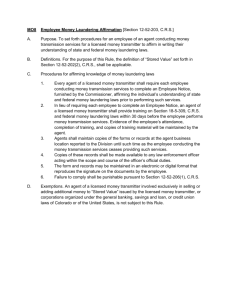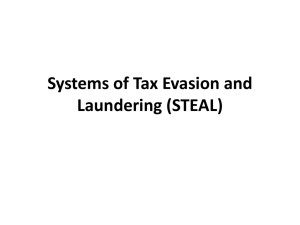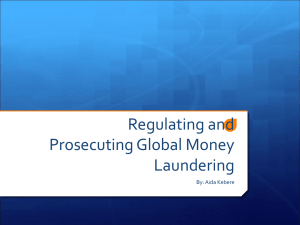and Prevention of Money Laundering Act
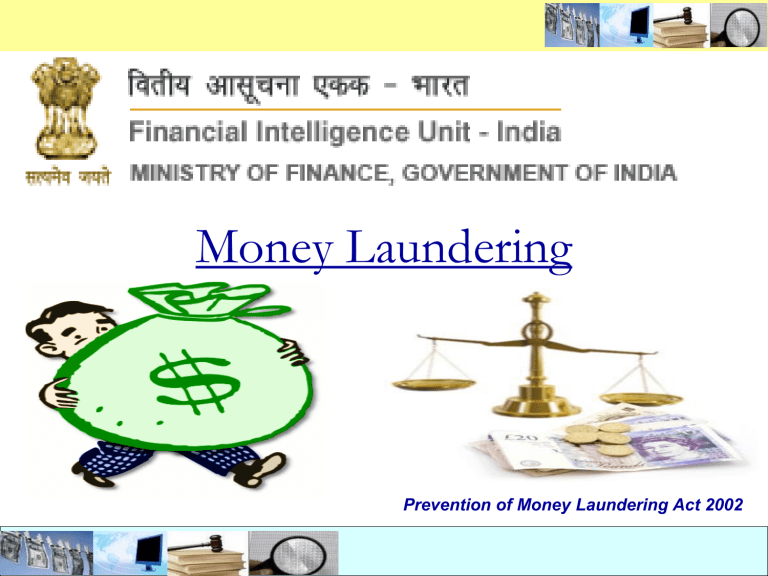
Money Laundering
Prevention of Money Laundering Act 2002
Group 8
03 Tashween Ahluwalia
06 Ayush Bhatia
07 Naresh Bhoravat
09 Sumitra Cardoz
11 Amit Das
23 Vinod Iyer
53 Mita Shah
61 Vishal Kalro
Road Ahead
Are the Foreign Exchange Management Act (FEMA) and Prevention of Money Laundering Act (PMLA) connected ?
What is Money Laundering
Salient Provisions of PLMA 2002
Techniques of Money Laundering
New Area of operations
Harmful effects of Money Laundering
Problem areas for India in having a proper AML
References
Are the Foreign Exchange Management Act (FEMA) and Prevention of Money Laundering Act (PMLA) connected ?
Broad Scheme of FEMA
SECTION 3 Prohibits dealings in foreign exchange except through an authorized person i.e. an authorized dealer, money changer, off shore banking unit or any other person being authorized to deal in foreign exchange or foreign securities.
SECTION 4 restrains any person resident in India from acquiring, holding, owning, possessing or transferring any foreign exchange, foreign security or any immovable property situated outside India except as specifically provided in the Act.
SECTIONS 13 and 15 of the Act with penalties and enforcement of the orders of
Adjudicating Authority
SECTION 36 to 37 pertains to the establishment of Directorate of Enforcement and the powers to investigate the violation of any provisions of Act.
Foreign Exchange Transactions
Current Account
Capital Account
Trade
Exports
Imports
Invisibles
Tour
Travel
Remittance
Gift
Profit/Div/int
FDI
Portfolio
Loan
(Govt/Pvt(ECB)
Foreign Source
(FII)
Indian Source
(GDR/ADR)
Fcy A/C
(RI & NRI)
Capital Account Transactions
Capital Account Transactions (By a person resident in India)
1. Investment in foreign securities
2. Loan raised in foreign currency in India or abroad
3. Acquisition or transfer of immovable property outside India.
4. Guarantees issued in favour of a person resident outside India
5. Export, import or holding of currency or currency notes
6. Loans and overdrafts from a person resident outside India;
7. Maintenance of foreign currency accounts in India and outside India
8. Insurance policy from an insurance company outside India
9. Remittance of capital assets outside India
10. Sale and purchase of foreign exchange derivatives in India and abroad and commodity derivatives abroad
Prohibitions - Capital Account Transactions
Two types of prohibitions
General Prohibitions
A person shall not buy / sell foreign exchange to an authorised person for any capital account transactions.
Special Prohibitions
A non resident person shall not make investment in India which is engaged in,
- the business of chit funds
- as nidhi company
- in agricultural or plantation activities
- in real estate business or construction of farm houses
- in trading in Transferable Development Rights (TDRs)
Current Account Transactions
A transaction other than a capital account transaction also includes,
1. payments due in connection with
- foreign trade
- other current business or services,
- Short term banking and credit facilities in ordinary course of business.
2. payments due as
- interest on loans
- Net income from investments
- remittances for living expenses of parents, spouse and children residing abroad
- expenses in connection with foreign travel, education and medical care of parents, spouse and children
Prohibitions - Current Account Transactions
Foreign Exchange Management (current account transactions) rules, 2000
The Classification of current account transactions which are,
- Totally prohibited
- Permitted, subject to prior approval of Govt.
- Permitted, subject to prior approval of RBI
Exhaustive List
- Authorized dealers are free to release foreign exchange upon the satisfaction that the transactions will not involve / designed for violation of the act.
Schedule I - Expressly Prohibited
Remittance out of lottery winnings
Remittance of income from racing/riding or any hobby
Remittance for purchase of banned products
Payment of commission on exports made towards investment in JV / WOS abroad of Indian companies
Payment related to callback services of telephones
Remittance of dividend by any company where dividend balancing is applicable
Remittance of interest income on funds held in Non – Resident Special
Rupee ( Account ) Scheme.
Payment of commission on exports under Rupee state credit Route, except commission upto 10% of invoice value of exports of tea and tobaco.
Schedule II -By ADs on approval from GOI
Remittances which need prior approval from the dealing ministry / department of GOI and permitted up to the amounts as mentioned in the approval letter –
Cultural tours
Advertisement in foreign print media
Freight of vessel charted by a PSU
Payment for import by a Govt, dept. on c.i.f. basis
Multi modal transport operators making remittance to their agents abroad , hiring of transponders by TV channels , ISPs
Remittances under technical collaboration agreements etc.
12
Schedule III-RBI approval if limits exceed
Transactions needing RBI approval for amounts exceeding delegated powers of Ads
Travel
Gift
Donation
Employment
Emigration
Maintenance
Medical expenses exceeding the estimates
Higher studies exceeding the estimates
Commission to agents for sale of flats etc. in India
Consultancy fees
Pre- incorporation expenses
What is money laundering?
Money laundering involves disguising financial assets so that they can be used without detection of the illegal activity that produced them. Through money laundering, the launderer transforms the monetary proceeds derived from criminal activity into funds with an apparently legal source.
The dirty money is called “Proceeds of Crime” (POC).
For example, Mr. A does not pay income-tax on his income of say Rs. 1,00,000. The entire amount is black money. He has gained Rs. 33,333 in income-tax. However, an offence under Income-tax is not covered in the PMLA schedule. Hence neither Rs.
33,333 nor Rs. 1,00,000 is covered by PMLA. Any attempt in converting the black money into white is NOT money laundering.
Similarly, sales tax, excise or octroi evasion is not covered under PMLA.
Similarly, offences under FEMA are not listed in the PMLA schedule. This means that an offence under FEMA is not covered by the PMLA.
The Main objective of the PLMA 2002
To Prevent, Combat and Control money laundering;
To Confiscate and seize the property obtained from the laundered money;
To deal with any other issue connected with money laundering in
India.
Apex Body – FIU India
Financial Intelligence Unit – India (FIU-IND) was set by the
Government of India vide O.M. dated 18th November 2004 as the central national agency responsible for
- receiving,
- processing,
- analyzing and
- disseminating information relating to suspect financial transactions.
FIU-IND is an independent body reporting directly to the Economic
Intelligence Council (EIC) headed by the Finance Minister.
Functions FIU India
Collection of Information:
- Cash Transaction reports (CTRs)
- Suspicious Transaction Reports (STRs) from various reporting entities.
Analysis of Information: In order to uncover patterns of transactions suggesting suspicion of money laundering and related crimes.
Sharing of Information: With national intelligence/law enforcement agencies, national regulatory authorities and foreign Financial Intelligence Units.
Act as Central Repository: Establish and maintain national data base on cash transactions and suspicious transactions on the basis of reports received from reporting entities.
Coordination: Coordinate and strengthen collection and sharing of financial intelligence through an effective national, regional and global network to combat money laundering and related crimes.
Research and Analysis: Monitor and identify strategic key areas on money laundering trends, typologies and developments.
A Typical Money Laundering Scheme – 3 Stages
(Stage 1) Placement: Illegal funds or assets are first brought into the financial system
Criminal activities
- Illegal arm sale
- Smuggling
- Activities of Organized Crime
- Embezzlement
- Insider trading
- Bribery
(Stage 2) Layering: Use of multiple accounts, banks, intermediaries, corporations, trusts, countries to disguise the origin.
(Stage 3) Integration: Laundered funds are made available as apparently legitimate funds.
Schedule Offences
As per 2(1)(y) of the Prevention of Money Laundering Act, 2002, Scheduled offence means
The offences specified under Part A of the Schedule, or
Paragraph 1 - The Indian Penal Code, 1860
Paragraph 2 - The Narcotic Drugs and Psychotropic Substances Act, 1985
Paragraph 3 - The Explosive Substances Act, 1908
Paragraph 4 - The Unlawful Activities (Prevention) Act, 1967
The offences specified under Part B of the Schedule if the total value involved in such offences is thirty lakh rupees or more , or
- The Indian Penal Code, 1860
- Arms Act, 1959
- Wild Life (Protection) Act, 1972
- Immoral Traffic (Prevention) Act, 1956
- Prevention Of Corruption Act, 1988
- The Securities and Exchange Board Of India Act, 1992
Total 25 Acts under this category
The offences specified under Part C of the Schedule.
- An offence which is the offence of cross border implications and which is specified in,-
(1) Part-A; or
(2) Part-B without any threshold; or
- The offences against property under chapter XVII of the Indian Penal Code
Punishment for Money-Laundering
Section 4 of the Prevention of Money Laundering Act, 2002 specifies punishment for money laundering as under:
Whoever commits the offence of money-laundering shall be punishable with rigorous imprisonment for a term which shall not be less than three years but which may extend to seven years and shall also be liable to fine which may extend to five lakh rupees
Provided that where the proceeds of crime involved in money-laundering relates to any offence specified under paragraph 2 of Part A of the Schedule, the provisions of this section shall have effect as if for the words "which may extend to seven years", the words "which may extend to ten years" had been substituted."
Framework
Framework
Framework
Framework
Framework
Reporting Entities
Reporting Entities
Reporting Entities
All Reporting Entities are required to: a) Maintain a record of prescribed transactions b) Furnish information of transactions to Director FIU-IND c) Verify and maintain the records of the identity of all its clients
Reports
Cash Transactions a) All cash transactions of the value of more than rupees ten lakhs or its equivalent in foreign currency b) All series of cash transactions integrally connected to each other which have been valued below rupees ten lakhs or its equivalent in foreign currency where such series of transactions have taken place within a month
Cash transactions are required to be reported to FIU-IND on a monthly basis by the 15 th day of the succeeding month.
Reports
Cash Transaction Reporting
6000000
5000000
4000000
3000000
2000000
1000000
0
2000-07 2007-08 2008-09
Co-operative and other
Banks
Private Foreign Banks
Indian Private Banks
Public Sector Banks
Reports
Suspicious Transactions
(a) gives rise to a reasonable ground of suspicion that it may involve proceeds of an offence specified in the Schedule to the Act regardless of the value involved
(b) appears to be made in circumstances of unusual or unjustified complexity
(c) appears to have no economic rationale or bonafide purpose
(d) gives rise to a reasonable ground of suspicion that it may involve financing of the activities relating to terrorism;
Suspicious transactions are required to be reported within 7 working days on being satisfied that the transaction is suspicious.
Reports
Suspicious Transaction Reporting
5000
4500
4000
3500
3000
2500
2000
1500
1000
500
0
2006-07 2007-08 2008-09
Intermediaries
Financial
Institutions
Banks
Reports
Counterfeit Currency Transactions
All cash transactions where forged or counterfeit currency notes or bank notes have been used as genuine or where any forgery of a valuable security or a document has taken place facilitating the transactions.
Reports
Counterfeit Currency Transaction Reporting
40000
35000
30000
25000
20000
15000
10000
5000
0
2007-08 2008-09
Others
Private Foreign Banks
Indian Private Banks
Public Sector Banks
Authorities under Money Laundering Act
Adjudicating Authority
Appellate Tribunal
Special Court
Director, Financial Intelligence Unit
Adjudicating Authorities eligibility
The Central Government appoints one or more Adjudicating Authorities
Consist of chairperson and two other members
Member should posses experience in the field of law, administration, finance or accountancy.
In the field of law
(i) He/she is qualified for appointment as District Judge; or
(ii) been a member of the Indian Legal Service and has held a post in
Grade I of that service
In the field of finance, accountancy or administration
(i) Posses qualifications, as prescribed.
Salient features of Adjudicating authority
Adjudicating Authority shall ordinarily sit at New Delhi
Central Government shall, by notification, specify the areas in relation to which each
Bench of the Adjudicating Authority may exercise jurisdiction
Chairperson may transfer a Member from one Bench to another Bench
The Chairperson and every Member shall hold office as such for a term of five years
(Max age 62)
Central Government shall appoint another person to fill the temporary vacancy
Chairperson or any other Member shall not be removed from his office except by an order made by the Central Government after giving necessary opportunity of hearing
Adjudicating Authority shall have powers to regulate its own procedure
Appellate Tribunal
Central Government shall, by notification, establish an Appellate Tribunal to hear appeals against the orders of the Adjudicating Authority
The Appellate Tribunal shall consist of a Chair-person and two other Members.
A person shall not be qualified for appointment as Chairperson unless he is or has been a
Judge of the Supreme Court or of a High Court or is qualified to be a judge of the High
Court.
A person shall be qualified for appointment as a Member-
- If he/she is or has been a Judge of a High Court; or
- Should be a member of the Indian Legal Service and has held a post in Grade I of that
Service for at least three years; or
- Should be a member of the Indian Revenue Service and has held the post of
Commissioner of Income-tax or equivalent post in that Service for at least three years;
The Director or any person aggrieved by an order made by the Adjudicating Authority under this Act, may prefer an appeal to the Appellate Tribunal
Every appeal should be filed within a period of forty-five days from the date on which a copy of the order made by the Adjudicating Authority or Director is received.
Appellate Tribunal may take up the appeal after 45 days if it is satisfied that there was sufficient cause for not filing it within that period.
Salient features of Appellate Tribunal
No sitting Judge of the Supreme Court or of a High Court shall be appointed under this section except after consultation with the Chief Justice of India
The Chairperson or any other Member may, by notice in writing under his hand addressed to the Central Government, resign his office
The Chairperson or any other Member shall not be removed from his office except by an order made by the Central Government on the ground of proved misbehavior or incapacity.
Appellate Tribunal shall be guided by the principles of natural justice and, subject to the other provisions of this Act.
The Appellate Tribunal shall have, for the purposes of discharging its functions under this Act, the same powers as are vested in a civil court under the Code of
Civil Procedure, 1908
An order made by the Appellate Tribunal under this Act shall be executable by the
Appellate Tribunal as a decree of civil court
Any person aggrieved by any decision or order of the Appellate
Tribunal may file an appeal to the High Court within sixty days from the date of communication of the decision or order of the Appellate Tribunal
Adjudication process
Director shall immediately after attachment of property forward a copy of the order, along with the material in his possession, to the Adjudicating
Authority
Director will within a period of thirty days from such attachment, file a complaint stating the facts before the Adjudicating Authority
On receipt of a complaint Adjudicating Authority examines the cases.
SNC of not less than thirty days is issued on such person calling upon him to indicate the sources of his income, earning or assets, out of which or by means of which he has acquired the property attached
The Adjudicating Authority shall, after-
(a) Considering the reply of SCN
(b) Hearing the aggrieved person and the Director /Officer assigned,
(c) Relevant materials placed on record before him, record a finding whether all or any of the properties referred to in the notice issued under involved in money-laundering
Techniques of Money Laundering
Hawala
Structuring Deposits – Also known as Smurfing
Third-Party Cheques
Credit Cards
Shell companies
Hawala
Hawala is an alternative or parallel remittance system
Money transfer without money movement
Hawala - Why is it popular?
Cost Effective
Efficient
Reliable
Lack of Bureaucracy
Tax evasion
Smurfing/ Structuring Deposits
The act of parceling what would otherwise be a large financial transaction into a series of smaller transactions to avoid scrutiny by regulators or law enforcement.
1.
Random small deposits made in different banks
2.
Deposits in accounts of relatives/ friends
3.
Buy bank drafts from various FI’s
Techniques of Money Laundering
Third-Party Cheques – Utilizing counter cheques or banker’s drafts drawn on different institutions and clearing them via various third-party accounts. Third party-cheques and traveller’s cheques are often purchased using proceeds of crime. Since these are negotiable in many countries, the nexus with the source money is difficult to establish.
Credit Cards – Clearing credit and charge card balances at the counters of different banks. Such cards have a number of uses and can be used across international borders. For example, to purchase assets, for payment of services or goods received or in a global network of cash-dispensing machines
Shell Companies These are fake companies that exist for no other reason than to launder money. They take in dirty money as "payment" for supposed goods or services but actually provide no goods or services; they simply create the appearance of legitimate transactions through fake invoices and balance sheets.
New areas of Operation of Money Laundering
Insurance Sector
Open Securities Market
Cyber Crime
Insurance Sector
Payment of premium for insurance policies in cash
Eg. 1:-Persons residing at same address and apparently related to each other paid insurance premium of over Rs 1 crore in cash each below Rs 50k in single month towards 229 life insurance policies.
Eg. 2:A husband and wife paid insurance premium over Rs 2.5 crore for over 15 policies out of which over Rs 80 lacs was paid in cash in installments of less than Rs 50k
Open Securities Market
Investment in capital markets and investment in mutual funds through multiple folios.
E.g. 1:-Accounts opened in the name of salaried employees and large investments in capital markets were made through these accounts .The employees wee office assistants and their employer was routing his unaccounted income through these bank accounts.
E.g. 2: An individual invested Rs 4 crore in a mutual fund through 25 folios. Some transactions were undertaken in the same scheme on the same day but in different folios
Cyber Crime
Financial fraud through use of internet /emailsThe Internet has presented a number of challenges for credit card issuers and cardholders
Account Number Generation Programs
Mass Compromises of Hacked Data with or without
Magnetic Stripe
PC spyware travels in emails or attaches itself when infected websites are surfed
Illegal web sites disseminate “how to” kits for perpetrating fraud
Harmful Effects of Money Laundering
Terrorism
Threat to Banking System
Threat to Economic and Political Stability
Terrorism
Terrorist Financing is defined as providing funds and financial services to a terrorist, terrorist associate or terrorist connected organization.
Some of the key differences between Money Laundering and Terrorist
Financing
Money Launderers will send crime proceeds through legal channels in order to conceal their criminal origins, whilst terrorist financiers will transfer funds that may be legal or illicit in origin in such a way as to conceal their source and ultimate use, which is the support of terrorism.
Threat to Banking System
Banks face a number of risks when their Institutions are used for money laundering/ terrorist financing activity, including :-
- Reputational Damage
- Loss of Customers
- Loss of staff (criminal charges against bank employees)
- Legal actions (fine / penalty)
- Loss of Business License
Examples of serious penalties on financial institutions due to AML deficiencies
Impact of Money Laundering on the Economy
Amendment in 2009
Under the amended PMLA Act, the Enforcement Directorate will be empowered to search the premises immediately after the offence is committed and the police has filed a report under the Code of Criminal Procedures.
It will also enable the Central Government to return the confiscated property to the requesting country in order to implement the provisions of the United Nation's convention against corruption.
New definitions of authorized persons and payment system operators are incorporated and the definition of financial institution is also amended in the new amended PMLA.
Financial intermediaries like full-fledged money changer, money transfer service providers such as Western Union and International Payment gateways, including VISA and MasterCard have also been brought under the ambit of amended PMLA.
Amendment in 2009 (Cont’d)
The passage of the Prevention of Money Laundering (Amendment) Bill, 2009 will enable India’s entry into Financial Action Task Force (FATF), an intergovernmental body that has the mandate to combat money laundering and terrorist financing.
The amended PMLA, will address India’s international obligation.
In news – (India)
India's lone banking regulator, Reserve Bank of India, recently blocked the application of Swiss bank UBS for a banking license in India on the ground that it was involved in $8 billion money-laundering racket.
The Enforcement Directorate has registered a case against
Satyam Computer and its tainted founder chairman B
Ramalinga Raju for alleged money laundering.
Common Wealth Games 2010 - India
Basel Committee on Banking Regulations & Supervisory Practices
The Basel Statement of Principles on the prevention of criminal use of the banking system was a significant breakthrough on the financial front to have some controlling mechanism for money-laundering on an international plane.
The Statement of Principles does not restrict itself to drug-related money laundering but extends to all aspects of laundering through the banking system, i.e. the deposit, transfer and/or concealment of money derived from illicit activities whether robbery, terrorism, fraud or drugs. It seeks to deny the banking system to those involved in money laundering by the application of the four basic principles:
1. Know Your Customer (KYC)
Customer Acceptance - Ensure that only legitimate and bona fide customers are accepted.
2. Compliance with Laws
Customer IdentificationEnsure that customers are properly identified to understand the risks they may pose.
3. Cooperation with Law Enforcement Agencies
4. Adherence to the Statement
Transactions MonitoringMonitor customers accounts and transactions to prevent or detect illegal activities.
Risk ManagementImplement processes to effectively manage the risks posed by customers trying to misuse facilities.
Problem areas for India in having a proper AML
Lethargy of Enforcement Mechanism
Growth of Technology
Unawareness about the Problem
KYC Norms – Do they serve the purpose
Smuggling – a rampant activity
Tax Laws
Absence of comprehensive enforcement agency
The influence of money on the people was appropriately portrayed by Henry Fielding as follows:
“Sir, money, money, the most charming of all things; money, which will say more in one moment than the most elegant lover can in years. Perhaps you will say a man is not young; I answer he is rich. He is not genteel, handsome, witty, brave, good-humoured, but he is rich, rich, rich, rich, and rich— that one word contradicts everything you can say against him.”
References
FIUINDIA
FATF
Wikipedia - FATF
